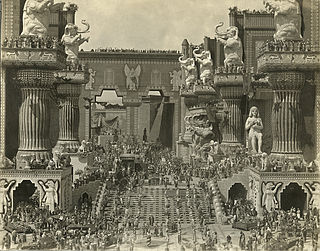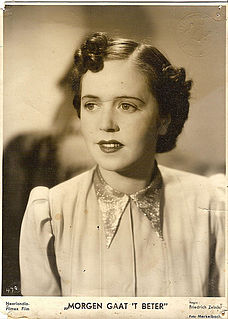Storyline
Annie and Lilly Vogels are the young daughters of Jan, a specialist in Delft pottery, working as a manager in a porcelain factory. Van Haaften is the owner and executive of the factory. While father Jan is working on an improved procedure for making porcelain, his daughter Lilly is very busy running the household. Her older sister Annie does not contribute as much to the household work because she focuses more on her music and her relationship with Leo, Van Haaften's son. Meanwhile, cousin Willem Berg receives a strong reprimand due to his carelessness while working at the factory.
Because of differences in social class, Annie and Leo have to keep their relationship an absolute secret. They are caught in the act by Leo's mother, she dismisses Annie immediately. When the head of the rich family is informed, he wants to prevent a scandal and sends Leo away for an indefinite period to America. Right before he leaves, Leo secretly agrees on meeting Annie and breaks off their relationship. Annie returns home broken hearted to get all her belongings and leave her home for good.
Six months go by very slowly. Jan's research on the new procedure for painting porcelain seems fruitless. To pay the rent, Lilly has started work as a florist. Meanwhile, Annie also has some financial trouble. She starts work as a pianist in a nightclub to pay for her expensive piano lessons she has been following. Lilly pays her a visit and reveals to Annie their father is on the verge of discovering the secret to the old Delftware glaze. Fraudulent cousin Willem overhears them talking about this and starts thinking up evil plans. He confronts Jan with this knowledge but to no avail, as his experiment fell through due to financial shortcomings. Lilly cannot stand her father's hardship any longer and goes to see Minny, the daughter of the Van Haaften's, to ask for money to finally be able to realise the procedure her father has conceived (the expensive ingredient platina is required to carry out this procedure with success). However, her visit to Van Haaften is not a success, the director also has financial troubles.
At one point, Annie is discovered in the night club by an impresario and is offered a contract for a tour of concerts. Meanwhile, Leo returns from America and asks his father permission to see Annie again. Jan asks Van Haaften for a loan, but Vaan Haaften deems his experiments as silly and fires him. Jan almost wants to give up, when in the park he stumbles on the fortune of a dead man who has committed suicide. The included letter states 'finders keepers'. From this money, he can finally buy platina and continue his experiments. In the meantime, Van Haaften's factory has gone out of business. Van Haaften cannot cope with this setback and during the night he commits suicide in his office.
During the same night, cousin Willem has broken into the factory in a bid to find out more about the secret of Delft. He sees the lifeless body of Van Haaften, but does not raise the alarm. Instead, he takes the remaining 3,000 gulden belonging to the factory which he finds in Van Haaften's pockets and he also pinches his suicide note. The next morning Jan finds the body. He calls in for help, but the police now suspect him of committing murder. He is considered to be the main suspect because he has a lot of money on his person and a some money went missing at the factory, and is arrested. Right before being taken to the police station, he hands over the secret Delft formula to his daughter Lilly.
Some time later Leo Van Haaften has taken over his father's position. In place of Jan, fraudulent cousin Willem is hired as the new factory manager and is still trying to find out the Delft secret. He discovers that Annie is now the owner of the formula and tries to persuade her to give him the formula, but she is more concerned with her and Leo's relationship. They would love to get married but are not allowed to as her father is in prison. In the ensuing trial, Jan is charged with the murder of Van Haaften with a demanded sentence of 20 years imprisonment. Eventually he is found guilty and sentenced to ten years imprisonment.
In the meantime, Willem uses force to try and get his hands on the formula. He repeatedly pesters Lily, but she learns the formula by heart and burns the paper on which it is written. The situation gets out of hand and her house burns down to the ground. She finds new accommodation at her sister Annie's house, but is still being harassed by Willem. She writes a mock formula and makes sure that he finds this fake copy. Willem struggles with the experiments, meanwhile Lily's father gives her the task to find the letter written by the person who had committed suicide in the park. After searching for a long time, she finds it and takes the new evidence to the judge.
Willem ultimately realises that the formula is a fake and starts bothering Annie again. He knows she is in possession of the rewritten draft of the formula and confronts her. Annie refuses to give it to him and runs. The situation escalates into a chase where Annie escapes by standing on the turning sails of a windmill. She is saved by bystanders and is escorted to the Van Haaften's estate. Meanwhile the suicide note of the father has been found in the estate. At the end of the movie Jan is cleared of all charges; he gets his job back at the factory and is finally able to complete his experiments to achieve the pottery with a special gleam. Cousin Willem is arrested and in spite of all that has happened, Leo and Annie get married.

Delft is a city and municipality in the province of South Holland, Netherlands. It is located between Rotterdam, to the southeast, and The Hague, to the northwest. Together with them, it is part of both Rotterdam–The Hague metropolitan area and the Randstad.

The Koninklijke Porceleyne Fles is the only remaining factory of the 32 earthenware factories that were established in Delft during the 17th century. It is known for its Delftware production, which has been active for more than 350 years, without interruption.
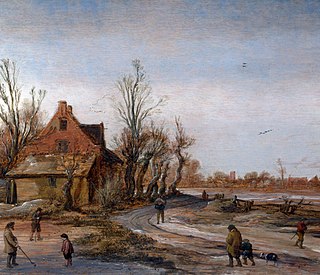
Esaias van de Velde was a Dutch landscape painter.

Notes of a Son and Brother is an autobiography by Henry James published in 1914. The book covers James' early manhood and tells of "the obscure hurt" that kept him out of the Civil War, his first efforts at writing fiction, and the early death of his beloved cousin, Minny Temple, from tuberculosis.

"Clash of the Tritons" is the twelfth episode of the first season of the American mystery television series Veronica Mars. Co-written by Phil Klemmer and Aury Wallington and directed by David Barrett, the episode premiered on UPN on January 11, 2005.

"Hot Dogs" is the nineteenth episode of the first season of the American mystery television series Veronica Mars. Written by Dayna Lynne North and directed by Nick Marck, the episode originally aired on UPN on April 19, 2005.
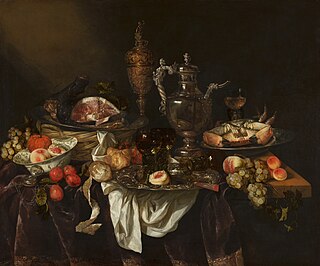
Abraham Hendriksz van Beijeren or Abraham van Beyeren was a Dutch Baroque painter of still lifes. Little recognized in his day and initially active as a marine painter, he is now considered one of the most important painters of still lifes, and in particular still lifes of fish and so-called 'pronkstillevens', i.e. sumptuous still lifes of luxurious objects.

Yamaleela is a Telugu film released in 1994. The film was directed by S. V. Krishna Reddy, introducing comedian Ali as the hero for the first time. This film was a huge box office success. This film was later remade in Hindi as Taqdeerwala, with Venkatesh and Raveena Tandon and in Tamil as Lucky Man, starring Kartik, Sanghavi and Manjula. A sequel for the movie titled Yamaleela 2 was released on November 2014.

Joannes de Mol was a Dutch minister, Patriot and porcelain manufacturer in the second half of the 18th century. De Mol - like many of his contemporaries - had a great interest in poetry and scientific experiments.

Jan van de Velde the younger was a Dutch Golden Age painter and engraver of animal, landscape and still-life subjects. He was the son of Jan van de Velde the Elder and the father of the still life painter Jan Jansz van de Velde.
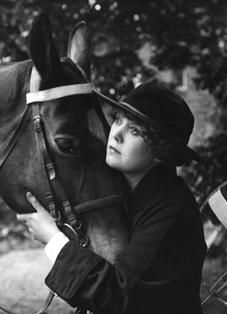
Majoor Frans is a 1916 Dutch silent drama film directed by Maurits Binger.
The Secret of Delft is a 1916 Dutch black and white silent crime film directed by Maurits Binger. The movie was also sold to France, where it was titled Le Secret du Phare. Only fragments of the original movie survived and are being kept in the Dutch Cinema Museum. It is hoped a complete copy survived in France.

Taqdeerwala is a 1995 Hindi film, produced by D. Rama Naidu under the Suresh Productions banner, directed by K. Murali Mohana Rao. It stars Venkatesh, Raveena Tandon in lead roles, with music composed by Anand–Milind. It is a remake of the 1994 Telugu film Yamaleela.

Alaina Marie Beaton, better known by her stage name Porcelain Black, is an American pop singer-songwriter, rapper, and model. At age eighteen, she embarked on her music career as a solo act under the name Porcelain and the Tramps with Virgin Records. However, Black and Virgin could not agree on the music she would record. The music she recorded was posted to her Myspace account, "rockcitynosebleed", where she gained millions of hits. After three years of trying to get out of the contract, she signed with RedOne's Universal Republic imprint, 2101 Records, late in 2009 and began working on her debut album. After many internal problems between the artist and record producer, RedOne, Porcelain Black announced the partnership had come to an end, with anticipation of releasing her debut album in the vein of her Porcelain and the Tramps project in 2015.

Agneta Wilhelmina Johanna van Marken-Matthes was a Dutch entrepreneur. She and her husband Jacques van Marken were involved in the manufacture of yeast throughout their lives, and were engaged in the cooperative movement, taking care of their workers. Matthes and Van Marken created living quarters for workers in her hometown, Delft in South Holland, named Agnetapark after her. These are considered a model for the cooperative development and construction of garden cities for workers. Matthes founded and ran a Delft perfume factory, Maison Neuve, to take advantage of a by-product from the yeast factory.

Maria van Utrecht was a notable figure in the Dutch Revolt and the history of the Netherlands.
Willem Jansz Verstraeten was a Dutch Golden Age tin-glazed maiolica maker in Haarlem.

